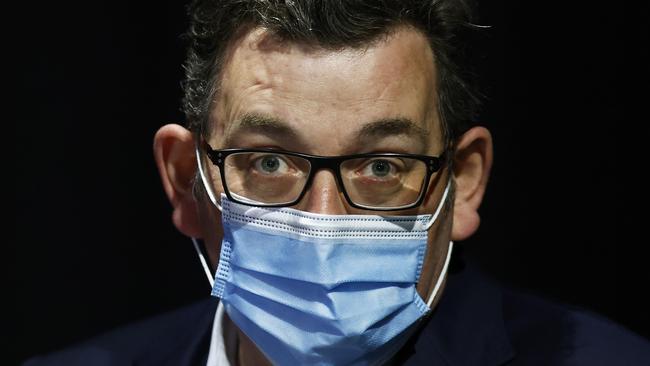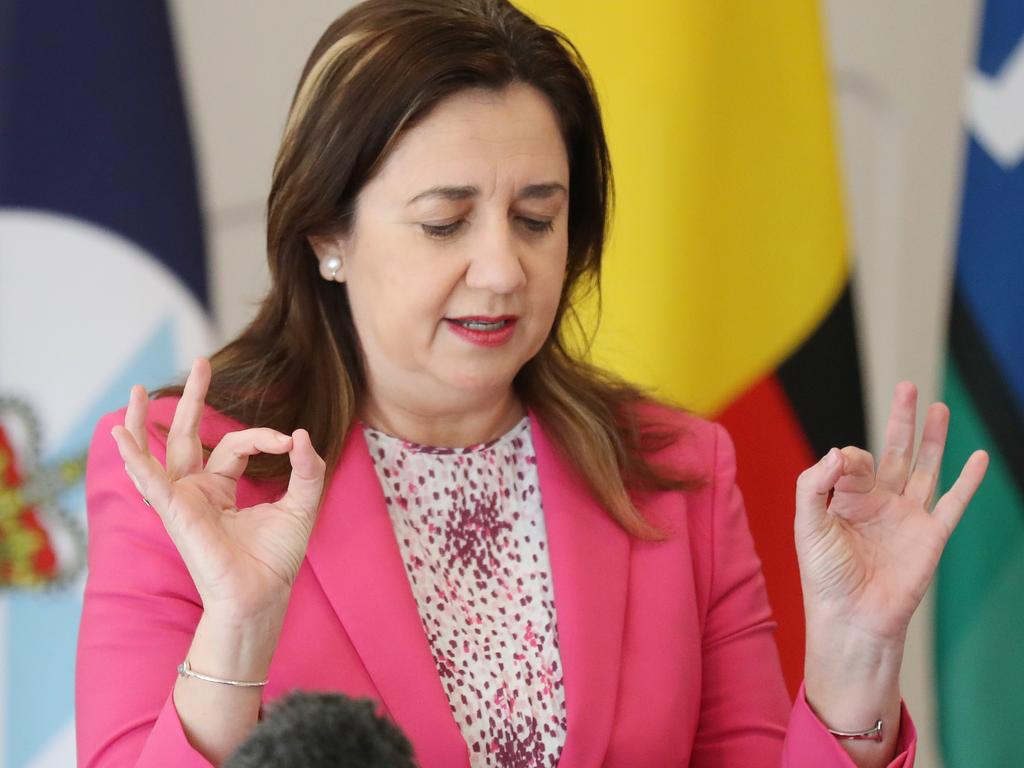Covid-19: Delta variant drives Daniel Andrews’ pragmatic U-turn
Victoria’s Premier now faces a career-defining challenge: slowly opening up the economy amid rising cases after six lockdowns have left many Melburnians in a state of gloom.

His challenges are as great as any Victorian premier has faced for decades and will be career-defining. The atmospherics for Andrews have soured in just days but it’s too early to confidently predict where this will end.
He emerged on Friday with what amounts to a different way of looking at the virus, with a focus on the future rather than the past.
Andrews strongly indicated that September and October will mark the beginning of the end of the draconian restrictions, with vaccination rates and hospital capacity key qualifiers.
If Andrews can engineer the slow opening up of the economy in the face of sharply rising cases, it will be one of the great, pragmatic reinventions in the face of an aggressive suppression strategy that has failed to halt the spread of the virus.
It is quite likely that Melbourne is now awash with the Delta variant. This is not what was promised in the sale of the six lockdowns to the electorate.
A week ago, some of Australia’s best epidemiologists were still hopeful that Victoria could retrieve its position and suppress the virus with manageable numbers.
The lightning pace with which Andrews has had to jettison his drive towards low numbers shows just how quickly the virus moves and how much the politics have changed.
The political threat to Andrews is not necessarily in the fact that Delta is spreading like a Black Saturday fire event, it is in the community’s reaction to how he has sold the strategy and the severity of the restrictions.
The six lockdowns have melted many Melburnians. The once great city is a black mess of gloom, anxiety and, for some, economic ruin.
For weeks, senior members of the Andrews government were quietly dreaming the Victorian Premier would inject some hope into his messaging and acknowledge the effect of the restrictions.
No one tells Andrews, Australia’s longest-serving political leader, what to do or even expect him to follow their advice if they were to offer it. Because that’s not how his government runs.
“People are really low and I think we should be aware of that, acknowledge it and talk to it,” one Labor MP said last week.
Concerns about the harshness of Andrews’ messaging and the lack of hope that had filtered through the Victorian community were everywhere.
The government’s response has, since the departure last year of health minister Jenny Mikakos, been decidedly masculine. Every two or three days, Andrews’ wild eyes – supported by his macho sidekick, Jeroen Weimar – have hammered the community about the wildly dangerous “infectivity” of the virus.
Stories of looming catastrophe, virus spread and pressure on the health system, all the while the numbers were relatively low; Andrews recently plunged his people back into a curfew and banned their kids from using playgrounds because he thought it was the only way ahead. It failed to deliver.
The compounding effect of the excessive aspects of the restrictions and the cascading lack of community hope will not be quickly forgotten. Andrews has been around Victoria’s health system for much of his political career. He is seen by some as a de facto member of the medical establishment, defaulting to the health advice at every turn, even if aspects of that advice failed the commonsense test.
Andrews is a complex figure who operates outside the normal political boundaries. But he is driven ultimately by the numbers.
This drive means that he doesn’t govern for all Victorians but very often the sectional interests that keep him in government, evidenced on Friday by his failure to admonish the hundreds of ambulance paramedics who have failed to get vaccinated. Paramedics were crucial in his 2014 election win, having been at war with the state Coalition over wages and conditions.
Andrews will be deeply troubled by the fact that this Delta surge is being fuelled by people who have given up on the basic measures that help keep the virus in check. Logging into QR codes, getting tested as soon as symptoms emerge, isolating and getting vaccinated.
It’s probable that a large part of the community has actually given up, exhausted by the demands of the pandemic and the lecturing from the Andrews pulpit.
Which poses a very real challenge for Andrews on how to reset.
While some epidemiologists are suggesting looser outdoors rules, Andrews will be wondering what message that sends to the community. I, for one, would plead for the mercy rule so we can take the pressure off young people. Give them greater freedoms to enjoy the spring weather, within the confines of common sense.
Andrews on Friday was strongly selling a message of opening up Victoria, incrementally, when vaccination rates increase, starting with the 70 per cent single dose, which will lead to the 5km travel limit doubling to 10km and exercise being allowed for three hours.
The key message in the wake of the rising numbers is that sufficient vaccination rates will lead to significant changes to rules. It’s a pretty clever pivot if he is able to manage the explosion in cases but at the same time engineer a subtle relaxation of the rules.
Let’s wait to see if this happens in 2021 before casting judgment.
As bad as it might appear for Andrews, let’s not forget that Victoria and NSW would be in vastly better positions if it weren’t for the failures in the commonwealth’s vaccine rollout. The extra pressure added to young people due to the sclerotic vaccine supply is nothing less than a national disgrace, notwithstanding the new deal with the UK. This is Andrews’ get-out-of-Pentridge clause and will be a powerful political weapon when Australia goes to the polls early next year.
No matter how much voters might dislike Andrews’ style, the nation’s two biggest states are in this position overwhelmingly because of poor vaccination rates. Never underestimate just how much the vaccination rollout debacle could garrotte the conservative vote in 2022.
Those writing off Andrews need to bear this in mind.






Dan Andrews is in a political and policy crisis over the coronavirus. Delta has won.